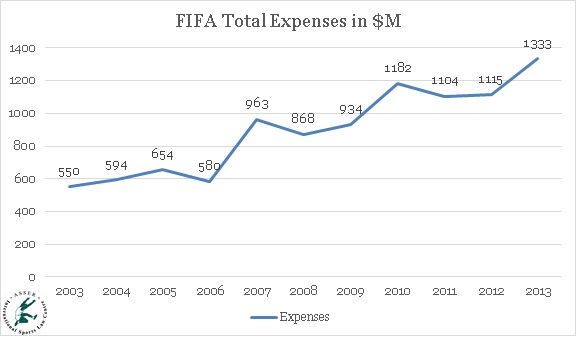The main lesson of this year’s transfer window
is that UEFA’s Financial Fair Play (FFP) rules have a true bite (no pun
intended). Surely, the transfer fees have reached usual highs with Suarez’s
move to FC Barcelona and Rodriguez’s transfer from AS Monaco to Real Madrid and
overall spending are roughly equal to 2013 (or go beyond as in the UK). But clubs sanctioned under the FFP rules
(prominently PSG and Manchester City) have seemingly complied with the
settlements reached with UEFA capping their transfer spending and wages. More...
On the 24th June 2014 the Spanish Audiencia Nacional issued its ruling on a hotly debated sports law topic: The
whereabouts requirements imposed to athletes in the fight against doping. This
blog aims to go beyond the existing commentaries (here and here) of the case, by putting it in the wider
context of a discussion on the legality of the whereabouts requirements. More...
After the success of this year’s World Cup in Brazil, FIFA President
Sepp Blatter can start concentrating on his Presidential campaign for next
June’s FIFA elections. Even though the 78-year old Swiss is not officially a
candidate yet, he is still very popular in large parts of the world, and
therefore the favourite to win the race. Nonetheless, even for the highly
experienced Mr. Blatter these elections will be different. All candidates will
have to respect the newly introduced Electoral Regulations for the FIFA Presidency. More...
Introduction[1]
The Court of Arbitration for Sport
(CAS) registers approximately 300 cases every year. Recently, the Swiss Federal Supreme Court – which is the sole
judicial authority to review arbitral awards rendered in Switzerland – reminded
in the Matuzalém Case (Case 4A_558/2011) that CAS awards may be enforced in other States that are parties to
the New York
Convention on the recognition and enforcement of foreign arbitral awards.More...
It may
come as a surprise to laymen, but chess players are subjected to doping testing.
Naturally, then, the questions follow as to why they are tested, and if they are
really tested (at least, with a level of scrutiny comparable to that which
physically-oriented athletes are regularly subjected). More...
The International Sports Law Digest will be a bi-annual post gathering recent material on International and European Sports Law. This is an attempt at providing a useful overview of the new, relevant, academic contributions, cases, awards and disciplinary decisions in the field of European and International Sports Law. If you feel we have overlooked something please do let us know (we will update the post).
Antoine Duval More...
This year’s FIFA congress in Sao Paulo should not be
remembered only for the controversy surrounding the bid for the World Cup 2022
in Qatar. The controversy was surely at the centre of the media coverage, but
in its shadow more long-lasting decisions were taken. For example, the new Regulations on
Working with Intermediaries was approved, which is probably the most
important recent change to FIFA regulations. These new Regulations will
supersede the Regulations on Players’
Agents
when they come into force on 1 April 2015. In this blog post we compare the old and
the new Regulations followed by a short analysis and prospective view on the
effects this change could have. More...
Luis Suarez did it again. The serial biter that
he is couldn’t refrain
its impulse to taste a bit of Chiellini’s shoulder (not really the freshest
meat around though). Notwithstanding his amazing theatrical skills and escaping
the sight of the referee, Suarez could not in the information age get away with
this unnoticed. Seconds after the incident, the almighty “social networks” were
already bruising with evidence, outrage and commentaries over Suarez’s misdeed.
Since then, many lawyers have weighed in (here,
here
and here)
on the potential legal consequences faced by Suarez. Yesterday FIFA’s
disciplinary committee decided to sanction him with a 4 months ban from any
football activity and a 9 International games ban. In turn, Suarez announced that
he would challenge the decision[1],
and plans on going to the Court of Arbitration for Sport if necessary[2]. Let’s be the advocates of the cannibal!More...
In 2009, Sepp
Blatter expressed his concerns that half of the
players participating in the 2014 FIFA World Cup would be Brazilians naturalized
by other countries. The Official list of Players released a few weeks ago tends to prove him
wrong[1].
However, some players have changed their eligibility in the past and will even be
playing against their own country of origin[2].
This post aims at explaining the key legal aspects in changes of national
affiliation and to discuss the regulations pertaining to the constitution of
national sides in general[3]. More...
Our first report on the FIFA business dealt with FIFA’s revenues and highlighted
their impressive rise and progressive diversification. In parallel to this
growth of FIFA’s income, it is quite natural that its expenses have been
following a similar path (see Graph 1). However, as we will see FIFA makes it
sometimes very difficult to identify precisely where the money is going. Nonetheless,
this is precisely what we wish to tackle in this post, and to do so we
will rely on the FIFA Financial reports over the last 10 years.

Graph 1: FIFA Expenses in USD million (adjusted for inflation),
2003-2013.
More...